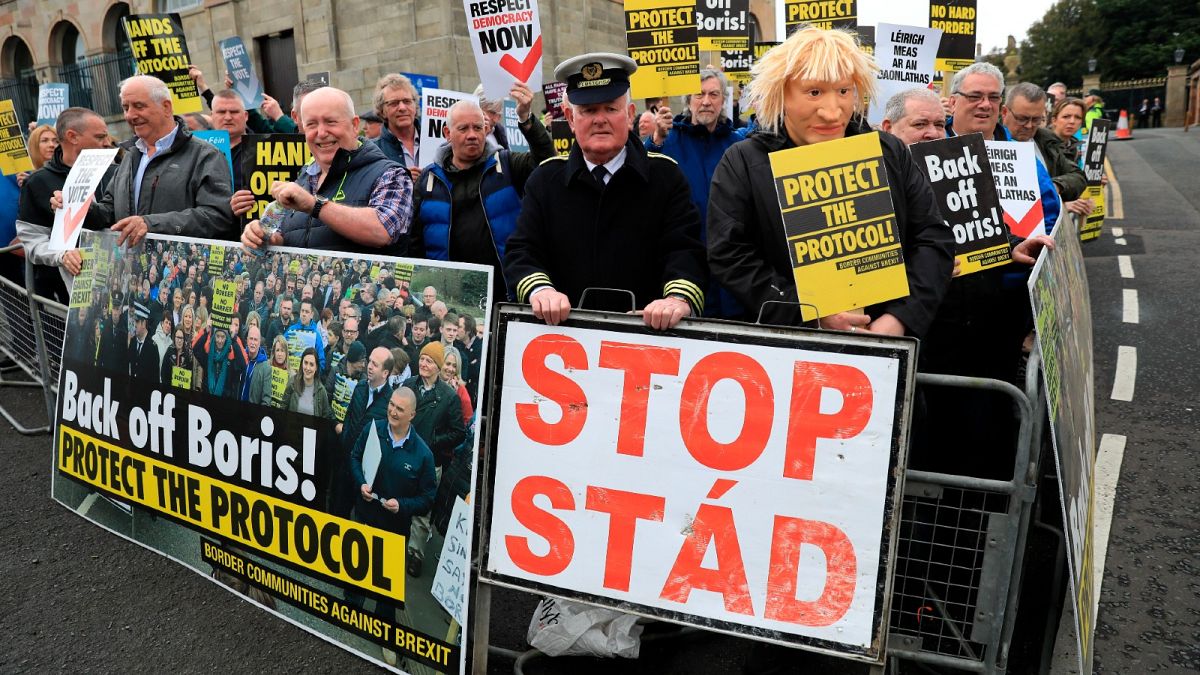Britain's government unveiled a draft law to unilaterally alter the Northern Ireland Protocol on Monday.
Brussels has threatened to launch legal action against the UK on Monday after London published legislation that would alter its Brexit deal on Northern Ireland.
What's the background?
London and Brussels, as part of Brexit, agreed on special trading arrangements for Northern Ireland as it is the only part of the UK with a land border with the European Union.
Normally, customs checks would have been made at the land border between Northern Ireland (part of the UK) and the Republic of Ireland (part of the EU).
But the region's dark history of sectarian violence means this was not possible. Instead, it was agreed to keep Northern Ireland in the EU's Single Market, meaning customs checks would be needed on goods coming into Northern Ireland from Britain, putting a de-facto border in the Irish Sea.
This angered Unionists in Northern Ireland, who wants to retain links with London rather than having borders put up between the two.
What changes is the UK proposing?
London says the arrangements, called the Northern Ireland Protocol, are not working, despite signing up to them initially.
Now they are proposing legislation to unilaterally change parts of the protocol.
The draft law unveiled on Monday afternoon by UK Foreign Secretary Liz Truss overrides parts of the Protocol by creating so-called green and red channels to waive customs checks for goods travelling between Great Britain and Northern Ireland and are intended for the Northern Irish market only.
It also wants to "ensure Northern Ireland can benefit from the same tax breaks and spending policies as the rest of the UK, including VAT" and bypass the European Court of Justice in case of disputes and use "independent arbitration" instead.
How did the European Union react?
The EU's Brexit negotiator, Maroš Šefčovič, said in a statement that the UK's "unilateral action is damaging to trust" reiterating that the protocol was negotiated and agreed upon by both Brussels and London in the lead-up to the country's exit from the bloc.
"The Commission will now assess the UK draft legislation," Šefčovič said, warning that "as a first step, the Commission will consider continuing the infringement procedure launched against the UK government in March 2021".
How has London defended the new draft law?
Prime Minister Boris Johnson's Conservative government now claims the Protocol endangers the Good Friday Agreement which put an end to decades of sectarian violence on the island of Ireland while unionists in Northern Ireland are refusing to join a new devolved government until their concerns are acted upon.
The EU has however refused to reopen negotiations into the Protocol, demanding that any changes be made within its framework. It has warned that any other unilateral action to change the deal would breach international law.
Ahead of the publication of the draft law, Johnson had sought to downplay its significance. telling LBC radio that it would bring "bureaucratic change" and a "relatively trivial set of adjustments".
"What we have to respect, this is a crucial thing, is the balance and the symmetry of the Belfast Good Friday Agreement," he also said, arguing that "one community at the moment feels very estranged".
Asked about possible retaliation from Brussels and the threat of a looming trade war, Johnson said it would be a "gross over-reaction".
"All we're trying to do is to simplify things," he added.
Truss also defended the draft law by making the round on British television and radio on Tuesday, telling Sky News that "the solution we're putting forward, doesn't make the EU any worse off, it protects the EU's single market at the same time as fixing these problems in Northern Ireland."
"And this is what I'm saying to the EU: I want to negotiate with the EU but they have to be willing to change the text of the protocol," she said.
What has been the reaction elsewhere?
On the island of Ireland, officials on both sides of the border have criticised the proposed legislation.
Ireland's Foreign Minister, Simon Coveney, warned however on Monday following a 12-minute phone call with Truss, that the draft law would be "deeply damaging to relationships on these islands and between the UK and EU."
"Minister Coveney said it marks a particularly low point in the UK's approach to Brexit," the statement said, adding that "the UK's unilateral approach is not in the best interest of Northern Ireland and does not have the consent or support of the majority of people or business in Northern Ireland.
Coveney and Šefčovič also spoke one-on-one with the Irish official stressing that the two men "are on the same page."
"EU remains keen to find a negotiated solution to NIP through partnership and compromise, but we need a partner that is willing to meet us half way!," he wrote on Twitter.
A majority of members of the Northern Ireland Assembly — MLAs — also announced in a letter to Johnson on Monday that they "reject in the strongest possible terms your Government's reckless new Protocol legislation, which flies in the face of the expressed wishes of not just businesses, but most people in Northern Ireland."
The letter was signed by 52 of the Assembly's 90 members including non-aligned MLAs — neither nationalist nor unionist — from the Alliance party.
They describe the Protocol as "a product of the hard Brexit" that they say Johnson championed and stress that "whilst not ideal" it currently "represents the only available protections for Northern Ireland from the worst impacts that hard Brexit". They added that the Protocol "offers clear economic advantages" to the region.
They call for "engagement with the European Union" on the basis of "trust and the rule of law rather than law-breaking and unilateral abrogation of treaty obligations."
"Finally, we strongly reject your continued claim to be protecting the Good Friday Agreement as your Government works to destabilise our region," it also states.
